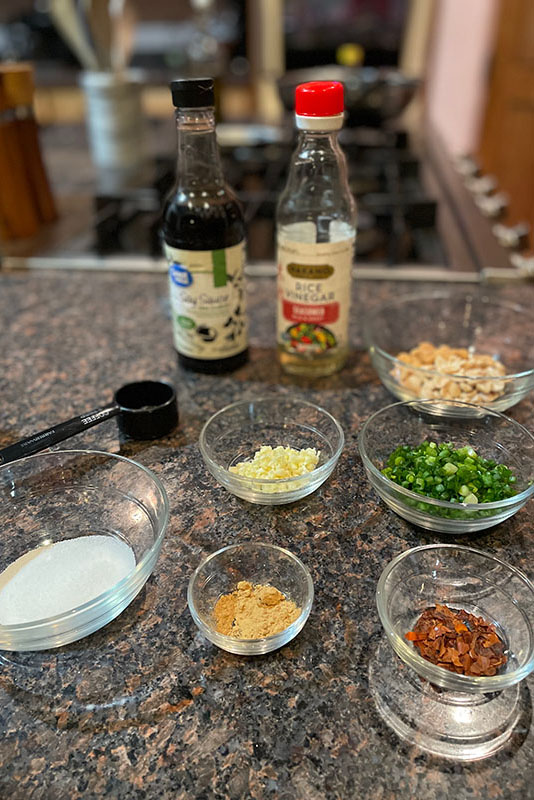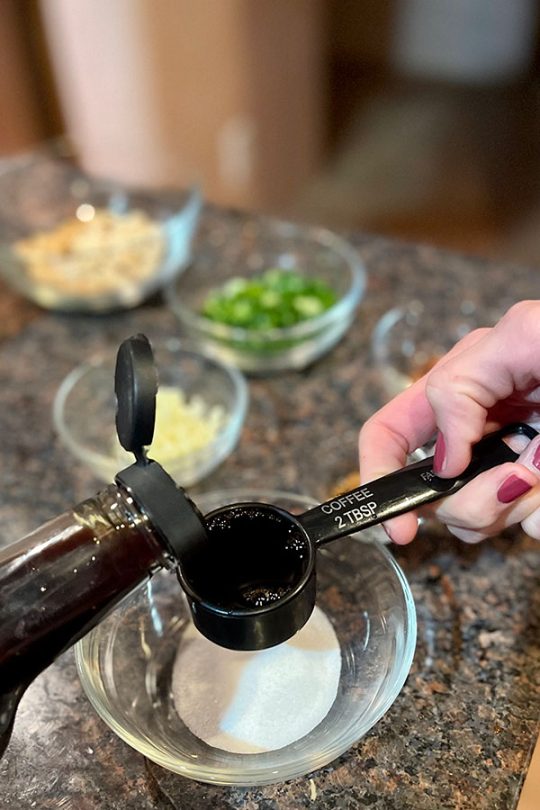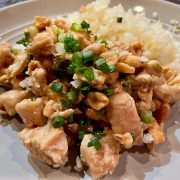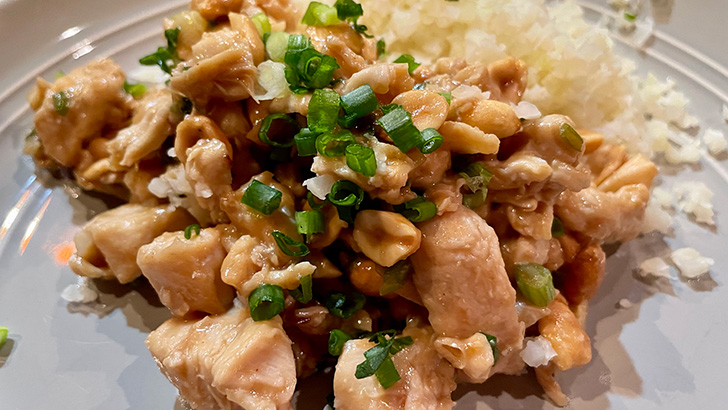This is Bobby’s original Kung Pao chicken recipe, a BlogChef favorite since 2008 — updated with new photos and video. All these years later, this dish is still as easy and tasty as ever. Enjoy!
What’s in Kung Pao chicken?
A quick look around the internet and you’ll see many variations of Kung Pao dishes. Some have vegetables, noodles, or different proteins. This being BlogChef, our recipe is streamlined and simple.

The ingredient list includes:
- Boneless, skinless chicken breast
- Cornstarch
- Sesame oil
- Green onions
- Garlic
- Crushed red pepper
- Powered ginger
- Rice wine vinegar
- Soy sauce
- Sugar
- Roasted peanuts
You can add more vegetables to the mix if you’d like, but you don’t have to. Good choices are zucchini and red bell pepper.
Substitutions you can make in this Kung Pao chicken recipe
Here are some substitutions you can make if you don’t have all the ingredients in your pantry:
- Swap out chicken for another protein. See our recipes for Kung Pao shrimp and Kung Pao beef. You could also use tofu!
- To make paleo-friendly Kung Pao chicken, sub in tapioca flour for cornstarch, cashews for peanuts, coconut aminos for soy sauce, and coconut sugar for white sugar.
- Sub in a dash of cayenne pepper for the crushed red pepper.
- Use fresh ginger in lieu of powdered ginger. Fresh ginger delivers a brighter, fresher flavor than powdered.
Is there a backstory on Kung Pao chicken?
Kung Pao chicken first originated in central-western China and has become very popular in the United States. This is an easy, westernized version made of wok-fried chicken, roasted peanuts, scallions, and a spicy, tangy sauce.
According to Furman University, Sichuan province governor Ding Baozhen created Kung Pao chicken. Baozhen apparently was a foodie in his day, and he enjoyed experimenting with peanuts and spice. One version of the dish’s origin is that Baozhen himself first made Kung Pao chicken and served it to his guests. In another version, the family chef first made the dish but Baozhen popularized it in his province. Either way, the dish took his name — Kung Pao was Baozhen’s official title.
Kung Pao chicken and variations of it have since become popular in the U.S. Two variations BlogChef readers love are:
This recipe is a westernized version that home chefs of any level can easily make at home.
Wondering what Kung Pao chicken tastes like? Here’s your answer.
Easy Kung Pao chicken recipe: Instructions
Here’s the rundown of how to make this simple stir-fried Kung Pao chicken.
Chop, chop
Chop up your scallions and mince your garlic. Set aside an extra tablespoon or so of scallions to sprinkle over your finished dish.
Mix your sauce

In a small bowl, combine rice wine vinegar, soy sauce, and sugar. This is a tangy, salty, and slightly sweet sauce.
Organize spices
Grab your dried red pepper flakes and crushed ginger. Measure these into small bowl together. You can add your chopped scallions and minced garlic to the same bowl. These all go into your wok at the same time, so there’s no need to keep them separate.
Prep and cook chicken
Make sure your boneless, skinless chicken is fully thawed. Pat it dry if it’s moist. The, cut the chicken into 1-inch pieces. Place your chicken pieces in a bowl, add the cornstarch, and toss to coat. The cornstarch helps to give your chicken a crispy exterior and also helps thicken your sauce.
Next, heat your wok or deep skillet to medium. Add in your sesame oil, swirl it around, and let it heat up.
Once the oil’s hot, turn up the flame to high heat and add the chicken. You want the wok to be HOT, as this will give you a nice texture on your chicken. Fry the chicken, stirring, until it’s done and nicely browned. That should take 5 to 7 minutes.
Fry aromatics
Remove your chicken from the wok to a plate. Toss your green onions, garlic, red pepper, and ginger into the hot pan. Stir fry this mixture for 15 seconds. They should become fragrant.
Now, add the sauce. Let it bubble a bit and add the chicken back to the wok. Stir so your chicken is coated with sauce. Stir in your peanuts and let it heat through.
Serve
Plate your Kung Pao chicken with white rice or cauliflower rice. I chose the latter and it was delicious. You might keep some soy sauce and extra red pepper flakes (or better, red chili oil) on hand for an extra flavor boost.
Why make it
Bobby’s original Kung Pau chicken recipe is easy, quick, and tasty. It has minimal ingredients and does not require deep-frying or marinating the chicken. The recipe works best if you have a wok, but you can alternatively fry your chicken in a large, deep saute pan.
You’d make this Kung Pao recipe if you’re craving Chinese takeout but you don’t want to invest too much time or money in the meal.

Easiest Kung Pao Chicken Recipe
- Prep Time: 20 minutes
- Inactive Time: 0 hours
- Cook Time: 10 minutes
- Total Time: 20 minutes
- Yield: 2 1x
Description
This is a simple and tasty recipe for sweet and tangy Kung Pao chicken. No deep-frying or marinading required!
Ingredients
- 1 lb. boneless skinless chicken breasts (cut into 1” pieces)
- 1 tablespoon cornstarch
- 2 teaspoons sesame oil
- 3 tablespoons green onions (chopped)
- 3 garlic cloves (minced)
- 1/2 teaspoon crushed red pepper flakes
- 1/2 teaspoon powdered ginger
- 2 tablespoons of rice wine vinegar
- 2 tablespoons soy sauce
- 2 teaspoons sugar
- 1/3 cup dry roasted peanuts
Instructions
- Prepare your ingredients: chop your scallions, mince your garlic, and measure your spices.
- Combine vinegar, soy sauce and sugar in a small bowl. Set aside.
- Combine chicken and cornstarch in a small bowl and toss to coat.
- Heat sesame oil in the wok over medium heat, add chicken and stir fry 5-7 minutes or until no longer pink inside. Remove chicken from work.
- Add green onions, garlic, red pepper flakes, and powdered ginger to the wok and stir fry for 15 seconds.
- Add the vinegar, soy sauce, sugar mixture to the wok.
- Return chicken to the wok and coat with sauce. Stir in roasted peanuts. Heat thoroughly.
- Top with additional green onions if desired and serve over white rice.
Notes
To make this dish Paleo, substitute:
- Tapioca flour for cornstarch
- Coconut aminos for soy sauce
- Coconut sugar for sugar
- Cashews for peanuts
Serve on cauliflower rice.
Nutrition
- Serving Size: 1
- Calories: 610
- Sugar: 6
- Sodium: 1048
- Fat: 25
- Saturated Fat: 5
- Unsaturated Fat: 17
- Trans Fat: 0
- Carbohydrates: 16
- Fiber: 3
- Protein: 78
- Cholesterol: 193
